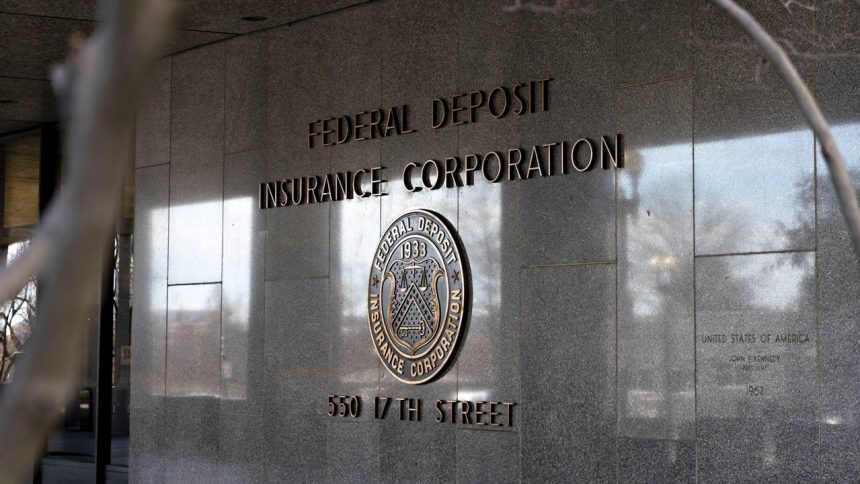Key takeaways
- Standard FDIC and NCUA insurance covers up to $250,000 of deposits and interest earned on those deposits.
- Online-only banks also provide FDIC insurance, but fintech companies aren’t part of the FDIC network.
- Before you open an account at a bank or credit union, it’s wise to verify that the institution offers deposit insurance.
Worried about whether your cash is safe at your bank? You’re not alone. When Gallup surveyed Americans about their feelings regarding bank safety after the 2023 failures of Silicon Valley Bank and Signature Bank, nearly half indicated some level of concern about their cash.
If you’re staying up at night stressed about whether your bank is going to wind up closing its doors, take a deep breath and relax. The nation’s banking system has some strong protections in place to make sure you can get your money back. Read on to learn about how deposit insurance works, what types of accounts are protected and why you can enjoy some peace of mind about your money.
How much does FDIC insurance cover?
The standard deposit insurance coverage limit, as offered at banks that are members of the Federal Deposit Insurance Corp. (FDIC), is $250,000 per depositor, per bank, per ownership category.
How much insurance do I have per bank and per account?
At each FDIC-insured bank where you have deposits, your money, up to $250,000, is protected. For example, if you have $250,000 in deposits at Bank A and $250,000 in deposits at Bank B, you are covered for $500,000.
You can have several accounts at one bank and be covered. A depositor’s combined balance on checking, savings and other traditional deposit accounts is insured up to $250,000. If your deposits are held in different ownership categories at the same bank (such as single accounts, joint accounts, irrevocable trust accounts and revocable trust accounts), they are separately insured. Since it is $250,000 per person, for couples with a joint account, up to $500,000 is covered.
Use the FDIC’s Electronic Deposit Insurance Estimator (EDIE) to calculate how much of your money is insured.
Is the interest I earn on my money insured?
The FDIC insurance limit of $250,000 includes principal and interest. If you deposit $250,000, and it earns $4,000 in interest, you are insured for only $250,000 if your bank fails. If you deposit $245,000 and accrue $5,000 in interest, you are insured for the principal plus all your interest because it doesn’t exceed the $250,000 FDIC insurance limit.
Some deposits that exceed $250,000, such as ones tied to trusts, may be eligible for more coverage. In that case, the FDIC would review the accounts and make a determination.
Does FDIC insurance cover savings, CDs and money market accounts?
FDIC insurance covers traditional bank deposit products, including checking and savings accounts, time deposits such as CDs, money market deposit accounts, Negotiable Order of Withdrawal accounts (NOW), as well as cashier’s checks, money orders and other official items issued by banks.
It doesn’t cover investment products, such as mutual funds, stocks, bonds and annuities, even if you bought them at an FDIC-insured bank. Nor does it cover the contents of safe deposit boxes.
Does FDIC insurance cover money market funds?
Money market mutual funds, which are invested in low-risk securities, aren’t FDIC-insured, even when you buy them from a bank.
Money market accounts, on the other hand, are traditional, interest-earning deposit products that are federally insured as long as they are deposited at an FDIC-insured institution. They are subject to the $250,000 insurance limit.
Are online banks FDIC insured?
Online-only banks may not offer branches, but they still offer FDIC insurance. The best online banks pay higher rates on savings, charge lower fees and deliver the peace of mind that your money will be safe even in the unlikely event of a failure.
There’s a difference, however, between online banks and fintech companies such as Chime, which aren’t part of the FDIC. Make sure you read the fine print, which often stipulates that a firm is a “financial technology company, not an FDIC-insured bank.” In many cases, fintech firms partner with FDIC banks to provide insurance.
Are credit unions insured?
Credit unions are insured by the National Credit Union Administration Share Insurance Fund, which operates with the same level of protection – $250,000 – as their bank counterparts.
The National Credit Union Administration administers the fund, which insures member deposits up to $250,000. The fund is backed by the full faith and credit of the United States. The Share Insurance Fund also separately protects IRA and Keogh retirement accounts up to $250,000 each, and separately insures revocable and irrevocable trust accounts.
What happens if my bank fails?
If your bank fails, you do not need to file a claim with the FDIC to recover your deposited funds. The FDIC will act quickly to make you whole by either setting you up with a new account at another insured bank that is equal to the insured balance at the failed bank; or, it will issue you a check for your insured balance at the failed bank.
Some deposits that exceed $250,000 may be eligible for coverage, such as deposits linked to trusts or deposits set up by a third-party broker. In those cases, the FDIC reviews the accounts and makes a determination of the amount of deposit insurance available to them.
When banks fail, the FDIC becomes the receiver of the bank’s assets and is responsible for collecting and selling those assets in order to settle the bank’s debts, including claims for deposits that exceed $250,000. It can take years to sell off the assets of a failed bank. As assets are sold, the FDIC will make periodic payments to depositors for their uninsured funds.
Are banks and the FDIC safe if the economy collapses?
If the economy melts down, some banks may fail. Consider 2009 and 2010 when the banking system was reeling from the subprime mortgage bust: Nearly 300 banks failed in that two-year period. The FDIC, however, is safe.
How do I know if my credit union or bank is financially safe?
You can use the FDIC’s BankFind tool to gather information about an FDIC-insured bank, including detailed financial information, its operating status and how to contact a bank regulator for information or assistance. The FDIC also publishes a list of failed banks.
To find out about the financial performance of a federally insured credit union, use the NCUA’s Research a Credit Union tool. The NCUA also publishes a list of failed credit unions or ones that have been placed into conservatorships.
Bottom line
While there is always a possibility that a bank could fail, it’s fairly rare. Only 11 banks failed in the first half of the decade, and even when they did, customers didn’t have to worry. The FDIC handled the process and made good on its promise to protect deposits. If you’re concerned about your money, double check that you’re covered by FDIC or NCUA insurance.
Read the full article here














